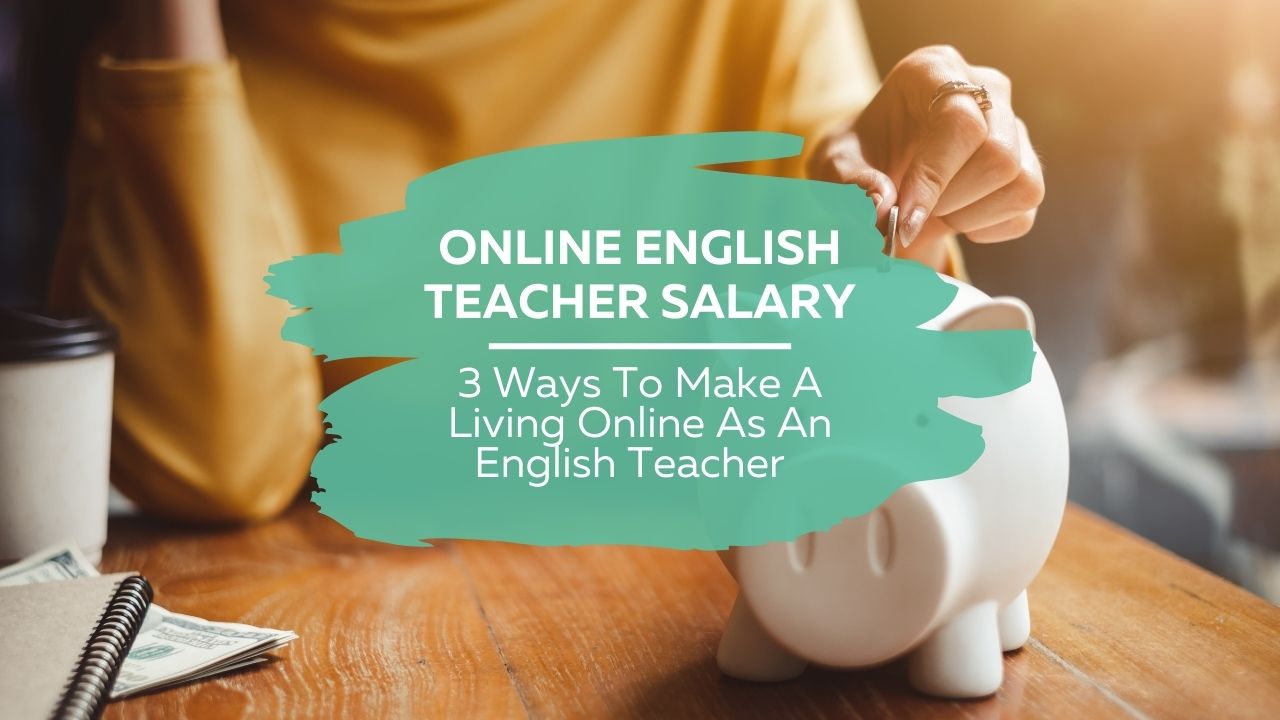
So you’re considering online English teaching as a career path but you’re wondering – how much can you make teaching English online and what’s a typical online English teacher salary?
Well, online English teaching isn’t exactly a get-rich-quick scheme. But it is a fulfilling career that can help you make ends meet and more.
As you’ll discover, “salary” is a bit of a misnomer when it comes to teaching English online pay. In all likelihood, you won’t be on salary, but rather self-employed. That’s the case even when the company you’re working for is “paying” you a fixed lesson rate.
This is important to be aware of – you won’t have an employee-employer relationship. You’ll be a freelancer which means you’re responsible for paying taxes and national insurance.
You’ll also have to use your own equipment as no-one is going to supply you with a computer or textbooks or whatever else you need. So that’s something else to take into account.
If you go in with your eyes open then there will be fewer surprises.
But as you’ll see, working for an online company is not your only option. In fact, there are 3 routes you’ll learn about in this post that will give you different ways to earn your online English teacher salary.
Pro Tip
If you want to become a qualified online language teacher and earn a living from home, I recommend checking out CeOLT (Certificate of Online Language Teaching).
How Much Can You Make Teaching English Online? 3 Options For Making Money

So if they’re not earning a salary, how much do online English teachers make? Well, that depends on which route you go down. We’ll look at a couple of different ones here.
- Freelancing for an online school like VIPKid or Cambly
- Freelancing on an online platform like iTalki or Verbling
- Working for yourself and finding your own clients, creating your own business including creating courses, products, programs etc
These scenarios all have their different advantages and disadvantages. The first two will give you the advantage of speed so they’re good if you need fast cash.
Setting up your own business takes time and success is not guaranteed. But you’ll have fewer limits on how much you can potentially earn.
In each case, please make sure you seek advice from the tax office or from a business advice service in your country regarding the arrangements you need to make for self-employment.
They’ll be able to point you in the right direction in terms of paperwork to fill out and the amounts and deadlines for tax payments.
#1 Freelancing for Online Schools

The easiest thing to do if you’re starting from scratch and don’t have any students is to work for a company. One of the most famous ones is VIPKid, a Chinese company that recruits American English speakers to teach Chinese children online.
Yes, you have to be American if you want to work for them. And if you’re living in the US, then you’ll be aware that there are timezone compatibility issues between the US and China. We’ll get to that in a second.
A friend of mine who worked for VIPKid a couple of years ago told me that she was earning $22-24 per class and that she brought in $2000 per month. Her schedule was 20-25 hours per week of classes (not including preparation time or other duties).
She was living in Mexico at the time and that was enough for her to live on. Now I don’t know how much you’re expected to pay in tax and national insurance in Mexico. But certainly, living costs are lower than in the USA for instance.
So, if you’re American, and living in a country or city with a lower cost of living, or you’ve got a frugal way of life e.g van living, then this route could work. You can certainly get up and running fast.
The big downside is the time zone issue. You’ll have to get up in the wee hours of the morning to teach which is not ideal. It seems that to make this option work long term, you’d need to live in a low-cost of living country that has timezone compatibility with China.
So if you’re willing to relocate to Europe or to the far East, then this could be an option for you.
Update: due to new Chinese government regulations, working for VIPKid might not be as simple as it once was.
Examples of Online English Teaching Companies
Here are some other online companies you could work for, along with the teaching English online salary – or better – pay they offer.
I'm just including these as examples and am not endorsing any of these sites. Please do your due diligence before you sign up to work with ANY online teaching company or marketplace.
- Cambly “pays” $10.20 per hour and you don't need experience or a degree, but you do need to be a native English speaker.
- Lingoda works with freelancers and “pay” ranges from €7-€11 per hour, plus you need to be a native speaker with teaching experience and a teaching qualification.
- English First works with native speakers from the US and the UK “pay” ranges from €12-€19 per hour. You'll need a degree and an English teaching qualification.
- 51 Talk is based in the Philippines and has really great pre-prepared lessons, the average monthly income is $500 with the maximum you can earn $1,500.
- If you want to teach adults only, Berlitz specialise in Business English. While the pay is not very high (approximately $12 per hour), the lessons are well-structured. It’s a good place to learn about teaching Business English.
What to Expect When You Freelance for a School
Schools provide the students and most of the time, they also provide the materials – generally, the lessons are 100% prepared for you, but in some cases, you will have to make minimal adjustments or adaptations to suit individual learners.
Most of the lessons will be discussion-based and you will be expected to keep the students talking while offering feedback and error correction.
The topics that you will be expected to discuss with students may range from daily life, including eating, shopping, cooking, going to work, going on vacation. And/or talking about their hobbies, families, their culture to discussing sports, and entertainment. If you're teaching adults, sometimes the topics will be more business or work-related.
If you work for a school, you will probably be expected to send feedback to the student and school on the students’ progress. You will want to begin your comments with something positive, then tell what needs to be improved. And end on a positive note, so as not to discourage students.
To teach online successfully, you'll need a secure Internet connection. Most companies will require you to have a stable Ethernet connection (your pc must be connected by a cable to the router). And they often verify your download and upload speed before and sometimes during your scheduled shift.
If you want to work for an online school as a remote English teacher, you will usually have to submit an application with proof of your experience and credentials.
After that, they will usually ask you to do a demo lesson with a member of their team. Or have you do a live demo with an actual student.
If you successfully pass the demo, they will make you an offer taking all of those factors into consideration to decide on your starting pay.
#2 Freelancing for a Teaching Marketplace

No doubt you’ve already heard of online teaching marketplaces like iTalki .You may have already used it yourself to get language tuition.
A few years ago, these types of marketplaces were very popular with budding online teachers. All you needed to do was create a profile. You uploaded your photo, a video, wrote a bit about your teaching, set your prices and you were off to the races.
That’s because the platform provided you with access to thousands of potential clients who were browsing it in search of the perfect teacher for them.
The downside here is that, unlike an online teaching company, iTalki does not guarantee you a fixed lesson rate. You set the rate. But that rate is very much determined by what the market is willing to bear.
As more and more teachers have joined the platform, there has been immense pressure on prices. The average salary for a professional Italki teacher is $15 per hour and the average rate for a tutor (someone without qualifications) is $10 per hour.
Obviously, that’s not a sustainable rate, especially given that the platform, like most others, takes a 15% cut of the amount. As a freelancer, you’re also expected to declare that income to your local tax office. So the math is not on your side here. The commission rate can be even higher though!
At Verbling you will earn between $18 and $28 per hour. Keep in mind that to register on this platform, you'll need to be a native English speaker and have previous teaching experience.
Preply is a Ukraine-based marketplace that takes a higher percentage. But the commission decreases as you teach more hours. When you start they take out 25% and then after 400 hours you get down to 18%.
But you can charge as much as $40-45 per hour, minus the commission of course. That said, typical rates are more like $15-25 per hour.
For your sanity, I’d recommend doing no more than 3-5 hours of lessons per day, and ideally not every day. If you want to get paid to teach English online and are hoping to make money on an online teaching marketplace, you’ll have to work quite punishing hours.
This could work if you’re living in a country where the cost of living is low. If you’re just doing online English teaching as a side gig, then you could make this work too.
Marketplaces can also be a great place to get your feet wet and see if online teaching is for you. But for long-term sustainability, you may prefer the third option.
#3 Working for Yourself

This option is potentially more lucrative. But it will take you much longer to get up and running. The first question is, where do you find students? If you’re not on a marketplace or working for a company, then you have to get out there and find people.
Your best starting point will be among your own personal and professional contacts. Get in touch with people to let them know that you’re teaching English online and are looking for clients. Do your homework beforehand: set up a booking page where people can pay and book their sessions.
You can even consider setting up a simple one-page website to start collecting email addresses.
You can also start putting up adverts around where you live. Even if you live in an English-speaking country, there are bound to be English learners in your area who would appreciate the convenience of an online lesson.
You could also consider contacting local companies who work internationally as they may have staff they want to train.
What to charge? Well, this is the million-dollar question. When you start out and don’t have much experience, you may want to charge a low rate to get people in the door and hone your skills. As you progress and improve, you can increase the rate for new clients.
The amount you charge will also depend on the type of people you teach. If you teach individuals, your rates may not be so high. If you teach business English to professionals, you can increase your rates (often the business will pay to upskill its employees.)
Consider lesson packages where you sell 10 or 15 lessons in one go. This will help you with predicting your income for the month.
When you work for yourself you can charge anywhere between $20 and $50 an hour. You also won't have to pay any commission to a platform. Remember to factor in your promotion costs and the time you spend marketing yourself.
Remember what I said earlier about working sustainably? If you want to be in the online teaching game for a while and not burn out after 6 months, then it’s going to be tricky to work more than 3-5 hours a day. You’ll spend the rest of your time planning lessons, doing admin, and promoting your work.
One thing that can help with time management and planning is narrowing your focus. If you choose to work with a particular group of people or focus on a particular skill, you’ll be able to create and re-use materials.
This will save you hours of planning time. And enable you to become an expert in that area. And thus charge more for the results you bring people.
But all of this is going to take time. You won’t have a full schedule of clients from the word go. So you’ll probably need another source of income on the side. You could consider a hybrid. Perhaps you do some hours for a platform or a school. And then the rest of the time you work on your own project.
Beware: platforms and schools usually have strict rules (that exist in the offline world too) about not offering your own private freelance services to these people. To avoid trouble, stick to the rules.
That said, if you start sharing your work more widely, by starting a YouTube channel, blog or podcast, or by having a social media presence, you can ask students from other platforms to follow you.
CeOLT: The Teaching Qualification That Allows You To Work For Yourself
If you're serious about working for yourself and building an online teaching business that lets you live your dream lifestyle, I recommend checking out the CeOLT (Certification of Online Language Teaching) programme.
This qualification not only helps you to become a better language teacher but also teaches you how to find paying students and build a language teaching business online.
You can find out more about the programme and it's unique “business building” component here.
Final Thoughts on Earning an Online English Teacher “Salary”

Is teaching English online worth it? While teaching English online won't make you a millionaire overnight, it is a rewarding career where you can positively impact people's lives.
If your priority is to get up and running quickly, then your best bet initially is to work for a company. Or to set up a profile on a platform. But beware of the pitfalls. You’ll be a freelancer, not a salaried employee which means filing your own taxes and registering for self-employed status.
You may also come across issues to do with timezones. And working sustainable hours if there’s downward pressure on prices. But there are creative solutions to these problems if you’re willing to relocate to a lower cost of living country or city. Or live more frugally (van living, tiny house, etc).
Working for yourself can be both more fulfilling professionally and financially. But it will take longer to set up and success is not guaranteed. However, it gives you a foundation for creating an online business with courses, products and more.
If you’re interested in the 3rd option, check out the my CeOLT certification programme. where you'll learn how to find high-paying students and start your new career as an online English teacher.

Olly Richards
Creator of the StoryLearning® Method
Olly Richards is a renowned polyglot and language learning expert with over 15 years of experience teaching millions through his innovative StoryLearning® method. He is the creator of StoryLearning, one of the world's largest language learning blogs with 500,000+ monthly readers.
Olly has authored 30+ language learning books and courses, including the bestselling "Short Stories" series published by Teach Yourself.
When not developing new teaching methods, Richards practices what he preaches—he speaks 8 languages fluently and continues learning new ones through his own methodology.









































